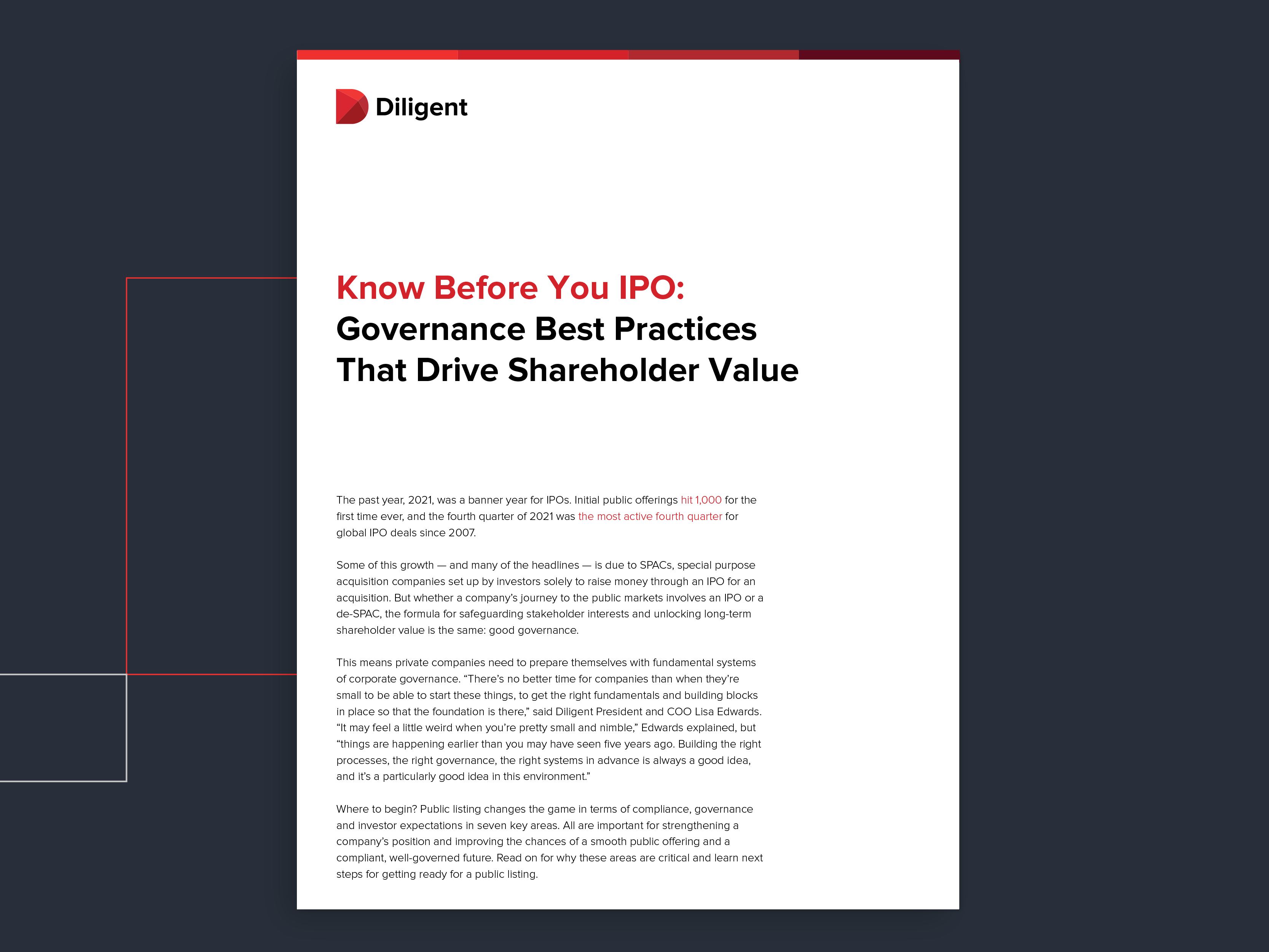So, you think you're ready for an IPO? Think again. The process of an initial public offering on any stock exchange requires a slew of entity data to be subject to scrutiny, and any slight issue with entity management and paperwork could derail the whole effort.
PwC, one of the Big 4 accounting firms and IPO experts, suggests a one- to two-year period is needed to plan and build the capabilities to think, act and perform as a public company. Without strong planning and organization of entity data pre-IPO, the process could be significantly delayed as the SEC asks questions and demands more information on your company’s entity management data.
Besides having a sound business model, a smooth and successful IPO needs:
- Good corporate governance and internal controls
- A streamlined financial reporting process that meets audit and reporting requirements
- A comprehensive template to perform monthly and annual budgets
- A strong and compliant board composition and management team with the right experience and good character
Companies should also ensurethey have the appropriate infrastructure to provide relevant, timely and reliable information about performance. After all, once the company is listed, full transparency will be required for regulators and investors. If your entity management and entity governance cannot support that, you're not ready for IPO.
What Entity Management Data Will Come Under Scrutiny in an IPO Process?
The exact entity data requirements for the IPO process depends entirely on the requirements and guidelines of both the exchange you choose to list on and the jurisdiction in which you operate. For an example, the New York Stock Exchange's IPO guide notes their requirements differ from Nasdaq's despite the exchanges being based in the same city. Listing in London, Amsterdam or on the ASX will have different requirements.
At a minimum, any company preparing and organizing entity data pre-IPO must ensure it has adequate systems and controls in place to meet the corporate governance requirements of the market where it will list and amend its articles of association accordingly. The articles of a listed company will often be much more complex than those of a privately held company; they will usually prescribe many more matters where shareholders need to be consulted, and may also include some corporate governance requirements, such as how shares are handled.
Consider the following entity data from KPMG's guide to going public:
- The appropriateness of any contractual obligations, including shareholder agreements, employment and compensation contracts, debt and lease agreements, shareholder or management loans, management agreements, and major supply contracts
- A review of any outstanding litigation involving the company
- Having annual financial statements audited; your IPO prospectus will generally include up to three years of audited financial statements immediately prior to the date of the prospectus, so it's a good habit to start early
- Auditing all internal policies, such as the code of conduct, employee handbook and onboarding processes, to ensure all employee data specific to the entity is captured accurately
- Ensuring the leadership team and board are of good standing, have no compliance skeletons in the closet, and are prepared for the new demands in their role post-IPO
There's also a range of legal compliance requirements. Consider compliance with Sarbanes-Oxley (SOX), as these requirements can make for a challenging IPO process. If this has not been on your radar before, you may find you require significant process changes to effectively implement a strong internal control framework. Waiting until the IPO kickoff for SOX compliance will cause major delays to the process and create a huge burden on staff, who should be focused on preparing the filing statements and coordinating with banks and underwriters. Likewise, ensure entities are in compliance with the Office of Foreign Assets Control (OFAC) and the Foreign Corrupt Practices Act (FCPA) if you're listing in the US. In the EU, there will be questions of data protection (GDPR) compliance, among other European directives. Then, of course, entity management requirements fall to the jurisdiction in which the entity is operating. It's likely, if you maintain good entity management practices backed by robust data processing and storage processes, that your entities will already be compliant in each market. To be sure, ensure your processes meet the minimum standards for board compensation and appointment, insider training, matters requiring shareholder approval, and financial reporting.
To unearth any potential issues, consider bringing in an external auditor to help get your organization's entity data in shape plenty of time before the IPO process is kicked off. An internal audit committee is a requirement of IPOs in most jurisdictions.
Who's Responsible for Handling This Entity Management Data?
Be aware that once the organization has listed, it's likely to find compliance costs are significantly higher than pre-IPO. Listed companies often hire dedicated teams just to ensure continuous disclosure and corporate governance obligations are met consistently. The work or organizing data pre-IPO, though, may well fall to a smaller number of compliance professionals.
Much of the entity data needed for an IPO surrounds the accounting and financial practices. Those involved in entity management will need to work closely with the CFO's office to ensure all reporting and filing requirements are known and under control. Financial statements of entities and technical accounting issues have historically raise the most red flags with the SEC.
Experts suggest companies consider organizing two working groups to guide the process of organizing entity data pre-IPO: one focused on the immediate process of going public and another focused on the tasks needed to prepare the business for being public.
Don't Go It Alone, Harness Technology to Organize Entity Data Pre-IPO
Regardless of which exchange is involved, which sector your company operates in, the size of its market cap or the number of its entities, the compliance team will need to do a lot of heavy lifting to get the organization ready for its debut on the stock exchange.
All expert guidance for organizing entity data pre-IPO points in the direction of careful long-term planning and ongoing entity management. Harness technology to simplify entity management processes to easily capture and retrieve more robust data, leaving the compliance and legal operations teams to focus on the strategic implications of getting the organization ready for going public.
Diligent Entities enables organizations to centralize and manage corporate data to improve entity governance globally, ensuring timely compliance and mitigating risk with a single source of truth. Easily search for and surface entity data quickly, and access real-time data to simplify the task of organizing entity data pre-IPO. Visualize the shape and scope of your entities to help identify potential entity challenges before the audit and manage ongoing compliance with regulations such as FATCA.
Schedule a demo to see how Diligent Entities can drive your efforts toward organizing entity data pre-IPO.





